外研版(2019)选择性必修第一册Unit 1 Laugh out loud! Developing ideas Reading课件(共64张PPT)
文档属性
| 名称 | 外研版(2019)选择性必修第一册Unit 1 Laugh out loud! Developing ideas Reading课件(共64张PPT) |  | |
| 格式 | pptx | ||
| 文件大小 | 27.0MB | ||
| 资源类型 | 教案 | ||
| 版本资源 | 外研版(2019) | ||
| 科目 | 英语 | ||
| 更新时间 | 2024-10-11 15:04:28 | ||
图片预览

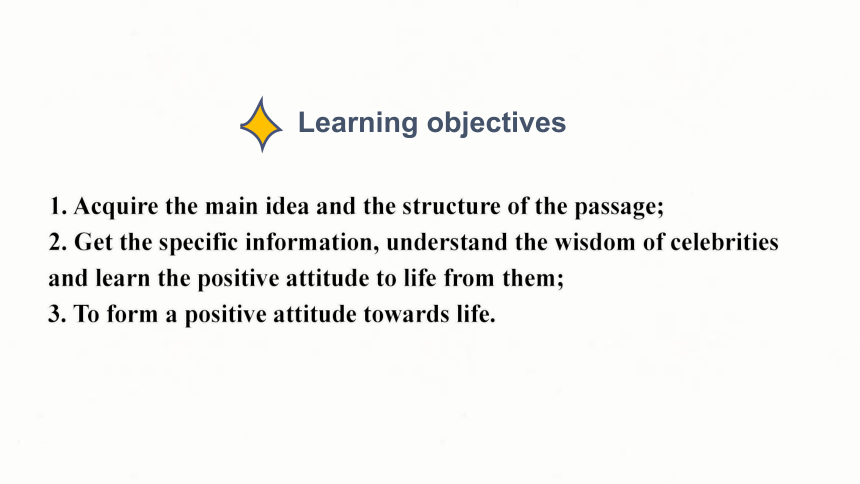

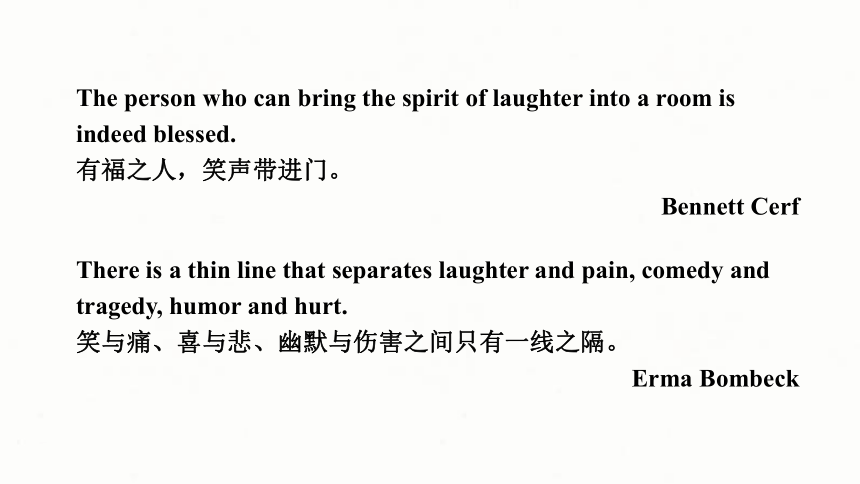
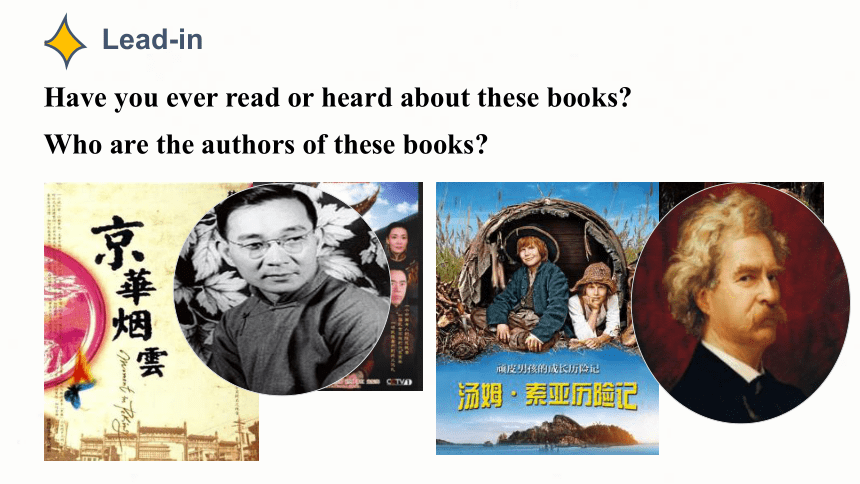
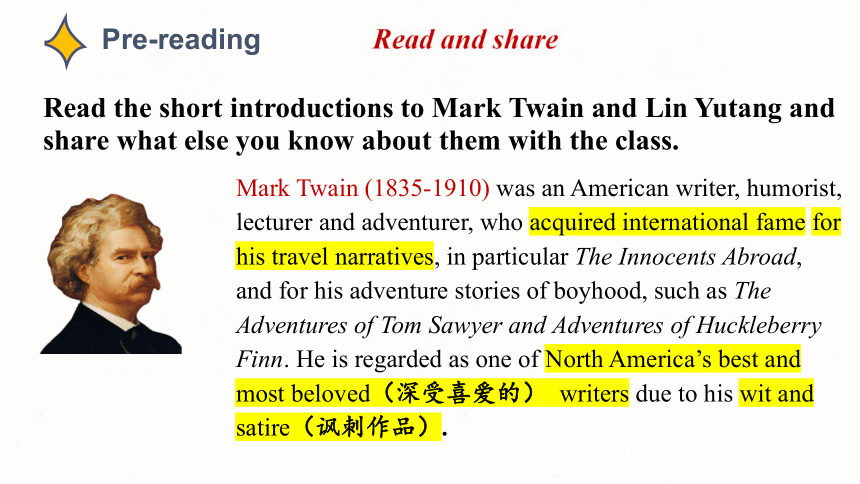

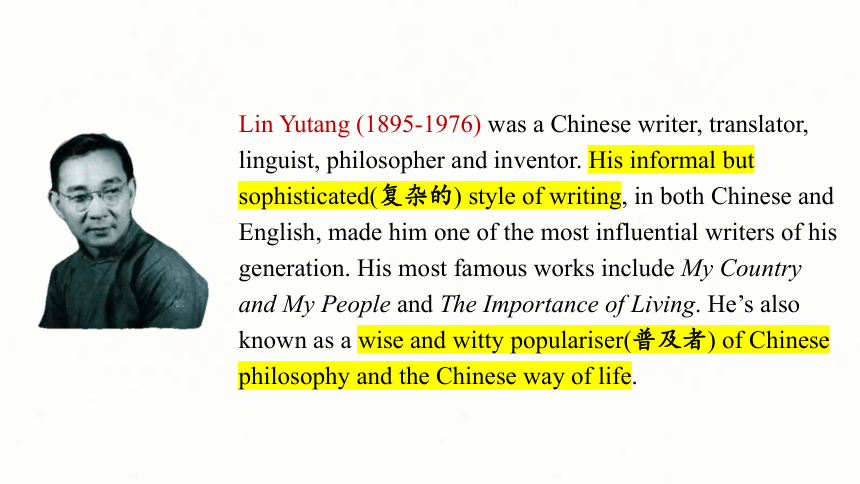

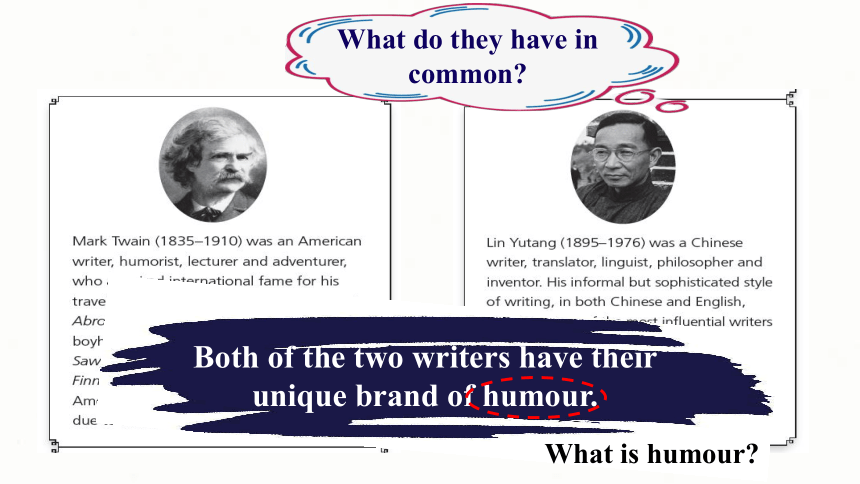
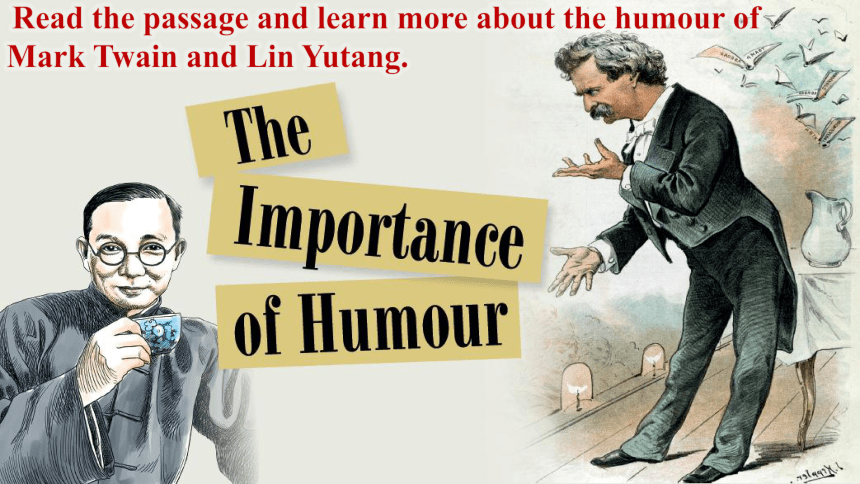
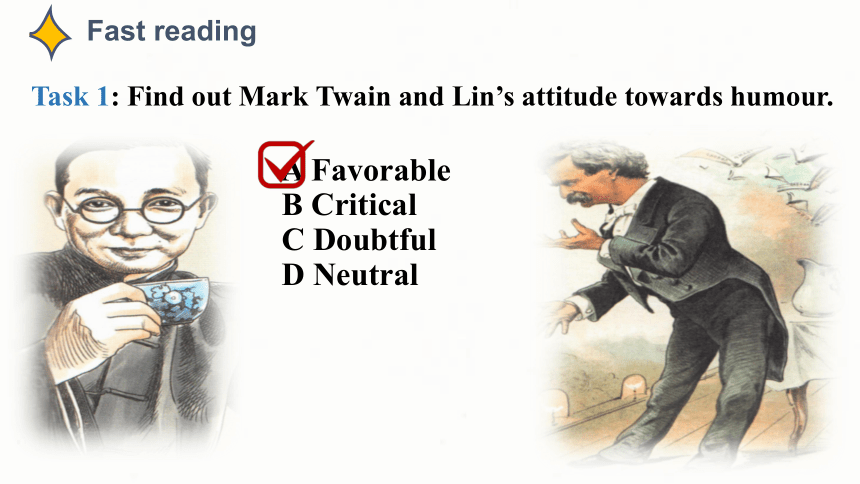
文档简介
(共64张PPT)
Unit 1 Laugh out loud!
Period 5 Developing ideas
1. Acquire the main idea and the structure of the passage;
2. Get the specific information, understand the wisdom of celebrities and learn the positive attitude to life from them;
3. To form a positive attitude towards life.
Learning objectives
Humour is the weapon of unarmed people: it helps people who are oppressed to smile at the situation that pains them.
幽默是手无寸铁的人的武器:它帮助那些被压迫的人在痛苦的情况下保持微笑。
Simon Wiesenthal
Warming up
The person who can bring the spirit of laughter into a room is indeed blessed.
有福之人,笑声带进门。
Bennett Cerf
There is a thin line that separates laughter and pain, comedy and tragedy, humor and hurt.
笑与痛、喜与悲、幽默与伤害之间只有一线之隔。
Erma Bombeck
Have you ever read or heard about these books
Who are the authors of these books
Lead-in
Mark Twain (1835-1910) was an American writer, humorist, lecturer and adventurer, who acquired international fame for his travel narratives, in particular The Innocents Abroad, and for his adventure stories of boyhood, such as The Adventures of Tom Sawyer and Adventures of Huckleberry Finn. He is regarded as one of North America’s best and most beloved(深受喜爱的) writers due to his wit and satire(讽刺作品).
Read the short introductions to Mark Twain and Lin Yutang and share what else you know about them with the class.
Pre-reading
Read and share
Lin Yutang (1895-1976) was a Chinese writer, translator, linguist, philosopher and inventor. His informal but sophisticated(复杂的) style of writing, in both Chinese and English, made him one of the most influential writers of his generation. His most famous works include My Country and My People and The Importance of Living. He’s also known as a wise and witty populariser(普及者) of Chinese philosophy and the Chinese way of life.
What do they have in common
Both of the two writers have their unique brand of humour.
What is humour
Read the passage and learn more about the humour of
Mark Twain and Lin Yutang.
Task 1: Find out Mark Twain and Lin’s attitude towards humour.
A Favorable
B Critical
C Doubtful
D Neutral
Fast reading
Task 2: What is the text type (genre) of the passage
A narrative
B exposition
C argumentation
D autobiography
to explain, introduce…
to tell a story
to argue/defend
to tell one’s lifetime experiences
√
Fast reading
A. B. C. D.
√
Task 3: Find out the structure of the passage.
Fast reading
The
Importance
of Humour
Humour has been an essential part of human behaviour for thousands of years. There is comedy in the texts of Ancient Greece, and medieval writings are filled with jokes. While these same jokes might not be as funny to us now as they were then, their authors understood that humour could not only entertain but also throw new light on sensitive or emotive issues.
The title indicates the main topic of the whole passage.
The first sentence serves as the main idea of para.1.
The last sentence is used to introduce the next paragraph.
Closer to modern times, someone who is remembered for his ability to combine humour with more serious messages is American writer, Mark Twain. Twain's particular style of writing is funny and often mischievous. For example, in his classic novel The Adventures of Tom Sauyer, he famously says, "Writing is easy. All you have to do is cross out the wrong words." But he is equally well known for his witty remarks in his everyday interactions with people. For instance, while on a lecturing tour of the United States, Twain went into a barber's shop to get a haircut and a shave. The barber, not recognising him, asked if he had a ticket to the lecture. When Twain replied that he didn't, the barber told him that if he wanted to go to the event he would have to stand, as there were no seats left in the theatre. Twain's response was, "That's just my luck. I always have to stand when that fellow lectures!"
Main idea:
Mark Twain is remembered for his ability to combine humour with more serious messages.
This paragraph uses examples to show humour plays an important role in Mark Twain's works and his life.
Like Twain, but on the other side of the world, Lin Yutang was soon to become famous for his unique brand of humour. A well-known bilingual writer, Lin brought the concept of humour to modern Chinese literature. In 1924, he creativly borrowed "youmo" from Ancient Chinese as the translation for the English word "humour". "Youmo" is sill being used in this way today.
Main idea:
Lin Yutang become famous for his unique brand of humour as a well-known bilingual writer.
This paragraph introduces Lin Yutan as a master of humour on the other side of the world.
Lin's quick wit helped make him famous as a master of humour. Once, having been invited to dinner at a university, he was put on the spot when the president suddenly asked him to give a speech. Thinking on his feet, Lin started to tell a story about a cruel Roman emperor who tried to feed a man to wild animals. First came a lion. The man whispered something in the lion's ear, after which the lion shook its head and walked away unhappily. Then along came a tiger. Again, the man whispered in the tiger's ear. The tiger looked shocked and hurried away. "What did you say to my animals " said the emperor, astonished. "I told them they had to make a speech after eating me for dinner." Lin's audience roared with laughter. With this little joke,Lin was able to make people laugh, while gently telling off the president.
Main idea:
Lin's quick wit helped make him famous as a master of humour.
Humour also plays an important role in Lin's works and his life.
Both Twain and Lin understood that humour isn't just about laughter, but is a way of life and a tool that can be used to illuminate the world. Lin even created an equation to explain this concept: Reality+Dreams +Humour=Wisdom. Living and working with others can sometimes be complicated, and humour makes this easier. Sharing jokes and laughing together can bring individuals and even communities together. Indeed, some may argue that our need for humour is almost as great as our need for water and air. In the words of MarkTwain, "Humor is mankind's greatest blessing".
Main idea:
Both Twain and Lin understood the importance of humour.
The conclusion of the passage: Humour has been an essential part of human life all over the world.
Organization of the passage
Introduction
Title & Para.1
The importance of humour
Body
Para. 2, 3, 4
Giving examples of Mark Twain and Lin Yutang to support the topic
Conclusion
Para.5
Humour is a tool and can be used to illuminate the world.
A.By making comparisons.
B.By giving examples.
C.By analysing their writing style.
D.By quoting them.
√
Task 4: How does the author introduce Mark Twain and Lin’s humor.
Fast reading
Task 1: Read each paragraph and answer the questions.
Read Para.1 :
Why is humor an essential part of human behavior for thousands of years
throw light on
使…较容易理解
Careful reading
Read Para.2 :
Q1. Why was Mark Twain famous in humor
Because his writing style was mischievous.
Because he could explain serious issues with humor.
Because he was the most humorous writer of modern times.
Because he liked to use satire and wit .
√
Careful reading
Read Para.3 :
How was the concept of humor brought to Chinese
Lin Yutang translated the English word “humor” into the ancient Chinese word “幽默” .
It has been in Chinese all the time.
Lin Yutang borrowed it from western literature.
Lin Yutang invented it.
√
Careful reading
Read Para.4 :
Q1. What can we learn about Lin Yutang from the sentence “Thinking on his feet, Lin started to tell a story about ...”
Lin was able to think and react quickly without any preparation.
Lin was good at telling stories on his feet.
Lin liked telling stories in his speech.
Lin had prepared a story in advance.
√
think on one’s feet
反应敏捷,反应快
Careful reading
Read Para.4 :
Q2. Which of the following implied realationship in Lin’s story is correct
A The man - Lin Yutang.
B The man - the president.
C The emperor
- the president.
D The lion and the tiger
- the other guests.
√
Careful reading
Task 2: Organise information from the passage and complete the
diagram.
Careful reading
Introduction
Humour is an essential part of 1 _________________. Authors have used it to 2 ______________, and throw new light on
3 _______________________________.
human behaviour
entertain
sensitive or emotive issues
Check the answers
throw light on sth
(提供新资料等)使某事更易理解
Mark Twain
Remembered for: ability to 4 _________________ with more
5 ___________________
Writing style: 6 ___________________________
Example: 7 _______________________________
Also well known for his witty remarks
Example: 8 ___________________________________________
_____________________________________________________
“That’s just my luck. I always have to stand when
that fellow lectures!”
The Adventures of Tom Sawyer
funny and often mischievous
serious messages
combine humour
Check the answers
Lin Yutang
Famous for his unique brand of humour
Evidence: 9 _________________________________________________
___________________________________________________________
Quick wit helped make him famous as 10 _____________________________
Example: 11 ________________________________________________
___________________________________________________________
He borrowed “youmo” from Ancient Chinese as the translation for the English word “humour” .
a master of humour
He told a story about a cruel Roman emperor who tried to feed a man to wild animals during the dinner at a university.
Check the answers
Conclusion
Humour is a 12 ________________ and a tool that can be used to
13 ___________________.
illuminate the world
way of life
Check the answers
A punch line
A punch concludes a joke and is intended to make people laugh. In a broader sense, a punch line can also refer to the unexpected and funny conclusion of any performance, situation or story.
“妙语(punch line)”常指笑话、演讲或故事中有趣、可笑而意味深长的表达。妙语通常言简意赅,能使演讲或陈述产生有趣或意想不到的结尾,具有幽默或戏剧性的效果。
首先,自嘲(self-deprecating)是妙语表达中最常使用的语言技巧,善于运用自嘲可以摆脱尴尬的困境。课文第二段讲述了幽默大师马克·吐温与理发师的故事。“That’s just my luck. I always have to stand when that fellow lectures!”这句话中,马克·吐温用“that fellow”代指自己,“always have to stand”委婉地表明自己的身份,同时“my luck”则乐观豁达地化解了自己没有被认出来的尴尬,也避免了理发师的窘迫。
其次,妙语中反讽(irony)的运用可以幽默委婉地讽刺他人,间接表明自己的真正意图。课文第四段讲述了林语堂面对校长让自己即兴演讲的尴尬,用一则故事巧妙类比自己当下的处境,委婉地表达了他对校长强人所难的不满。
What’s the punch line in the joke about Mark Twain (Para.2)
What did Twain’s response to the barber’s question imply
He gave the lecture himself.
He couldn’t get a ticket to every lecture.
He had to stand because of his bad luck
He didn’t like the fellow that lectured.
√
幽默 humour
T\F: As a bilingual writer, Lin Yutang created the word “youmo” as the translation for the English word “humour”
“眴兮杳杳,孔静幽默。”
--屈原,《九章·怀沙》
翻译家李青崖:“语妙”
语言学家陈望道:“油滑”
语言学家唐栩侯:“谐穆”
1. Why is Lin Yutang’s joke about the man and wild animals funny
2. Do you agree with Mark Twain’s remark on humour at the end of the passage Give your reasons.
3. How can a sense of humour help you in your daily life Give an example.
4. In what ways do the two reading passages in this unit help you to better understand the meaning of having a light-hearted attitude towards life
Think Share
Because with the little joke, Lin was able to make people laugh, while gently telling off the president.
1. Why is Lin Yutang’s joke about the man and wild animals funny
Examples:
Yes, I do agree with … because without humour, life is boring / because humour can help us feel good.
No, I don’t agree with … because
sometimes improper humour makes
people embarrassed …
2. Do you agree with Mark Twain’s remark on humour at the end of the passage Give your reasons.
3. How can a sense of humour help you in your daily life Give an example.
Examples:
Humour is the best way to relieve stress. Once, …
Humour makes our relationship better. …
Example:
Humour makes our life more enjoyable and meaningful. When we laugh, we feel the positivity which helps us to stay focused on our life.
4. In what ways do the two reading passages in this unit help you to better understand the meaning of having a light-hearted attitude towards life
Discuss and present your opinion of the equation from the passage.
What is your understanding of “reality” and “dreams”
What is the function of “humour” in this equation
What is your understanding of “wisdom”
Reality + Dreams + Humour = Wisdom
Group Work
1. Work out the meaning of this equation. Consider the following:
Discuss and present your opinion of the equation from the passage.
3. Share your opinion with the class.
Reality + Dreams + Humour = Wisdom
2. Decide whether you agree with Lin’s definition
of wisdom. Think of examples to support your
opinion and make notes.
看清现实,心怀梦想,幽默面对,才是人生智慧。
Think & Share
Reality +Dreams +Humour
= Wisdom
林语堂的人生公式
1.重要的一部分
2.使了解(某事)
3.把A和B结合起来
4.划去,删除
5.日常交流
6.使某人难堪
7.匆忙离开
8.做演讲
9.大笑
10.斥责; 训斥
11.照亮世界
an essential part
throw light on
combine A with B
cross out
everyday interaction
put sb on the spot
hurry away
make a speech
roar with laughter
tell off
illuminate the world
Important lexical chunks
1. cross out
2. brand of...
3. think on one's feet
4. roar with laughter
5. tell off
划掉,删掉(字句)
某种……;……的品牌
头脑反应很快;才思敏捷
发出哄笑,哈哈大笑
批评,谴责,斥责
Important lexical chunks
1. While these same jokes might not be as funny to us now as they were then, their authors understood that humor could not only entertain but could also throw new light on sensitive or emotive issues.
该句是主从复合句,其中while引导让步状语从句, 从句中包含了一个 “as + 形容词短语 + as” 结构,第二个as引导方式状语从句;
在主句中that引导的宾语从句中使用了not only … but also …结构。
Language points
【翻译】
虽然同样的笑话现在对我们来说可能不像当时那么好笑,但是它们的作者明白幽默不仅可以娱乐,还可以(让人们) 对敏感或情绪化的问题有新的认识。
remark n. something that you say when you express an opinion or say what you have noticed
言论; 意见,评论
2. But he is equally well known for his witty remarks in his everyday interactions with people.
但他在日常与人交往中的诙谐言辞同样广为人知。
make remarks/a remark on/upon... 对……发表评论
e.g. It’s impolite to make a remark on the appearances of others.
remark on/upon ... 评论……
remark that … 说……, 评论……
e.g. He remarked on / upon the difference in safety measures at the two airports.
My father remarked (that) I looked unhappy.
remark v. to say something, especially about something you have just noticed 评论; 谈论; 说起
【拓展】
remarkable adj. 非凡的, 不寻常的, 显著的
be remarkable for … 因……而引人注目, 因……显著
【语境应用】
根据括号内的汉语提示补全下面句子(每空一词)。
1) It would be rude to __________ __________ ________ ___________ (评论她的发型).
2) I didn’t like those who kept __________ __________ ________ ________ (评论我们).
3) I __________ ________ __________ ________ (注意到了这些美丽的花) as soon as I entered the house.
remarked these beautiful flowers
remark on / upon her
hairstyle
making remarks
about us
3. Once, having been invited to dinner a university, he was put on the spot when the president suddenly asked him to give a speech.
有一次,他被邀请到一所大学吃晚饭,当校长突然让他做演讲时,他感到很为难。
spot n. a particular place or area, especially a pleasant place where you spend time 地点; 场所
a small round area that has a different colour or feels different from the surface it is on 斑点
a small dirty mark on sth. 污渍
e.g. The flower is yellow with red spots.
Her skirt was covered with spots of mud.
The lake is one of the local beauty spots.
spot v. to see or notice a person or thing, especially suddenly or when it is not easy to do so 发现; 看出
e.g. John finally spotted the shirt he wanted.
【归纳】
on the spot 当场; 立刻; 马上
spot sb./sth. doing sth. 发现某人/物正在做某事
【语境应用】写出下列句子中spot的词性及中文释义。
1) On the way, we spotted a man holding a piece of paper that said, “Lost my job. Family to Feed.”
___________ ____________
2) Jack showed me the exact spot where he had asked Rose to marry him. ________ ________
3) She was wearing a black skirt with white spots.
________ ________
看见, 发现
名词 地点
名词 斑点
动词
whisper v. to speak or say something very quietly, using your breath rather than your voice 悄声说; 低语; 耳语
e.g. You don't have to whisper; no one can hear us.
What are you two girls whispering about
James leaned over to whisper something to Michael.
My nephew whispered (to me) that she was confident of success.
4. The man whispered something in the lion’s ear, after which the lion shook its head and walked away unhappy.
那人在狮子耳边低声说了些什么,然后狮子摇摇头,不高兴地走开了。
whisper n. a very quiet voice you make using your breath and no sound 低语; 耳语
e.g.
I heard whispers outside my room.
“Where are we going ” he asked in a whisper.
【归纳】
whisper sth. to sb. 把某事悄悄告诉某人
whisper about 低声谈论……
whisper sth in one’s ear 在某人耳边低声说某事
It is/was whispered that … 有人私下说……
in a whisper 低声地
【语境应用】 根据汉语意思补全下面句子(每空一词)。
1) 这是他悄声说的,所以我没有听清说的是什么。
He said it ________ ________ ________, so I couldn't hear.
2) 今天早上她对我悄悄说了这个消息。
She __________ ________ ________ ________ ________ this morning.
3) 小女孩小声对我说她觉得很害怕。
The girl ___________ ________ ________ ________ she felt very afraid.
whispered to me that
in a whisper
whispered the news to me
5. A punch line concludes a joke and is intended to make people laugh.
妙语是笑话的结尾,意在引人发笑。
conclude v. to end something such as a meeting, book, event, or speech by doing or saying one final thing
结束, 终止
to decide that something is true after considering all the information you have 断定, 推断出
【归纳】
conclude sth. (from sth.)
conclude (from sth.) that ...
conclude (sth.) with sth. 以……作为结束
conclude (sth.) by doing sth. 以做某事结束
e.g. Those are the facts; what do you conclude from them
He concluded (from their words) that they were not in favour of the plan.
The meeting concluded at 8 o’clock.
My teacher concluded (her talk) with a funny story.
Jane concluded (the speech) by reminding us of our responsibility.
(从……中)推断出
【拓展】conclusion n. 结论; 结束
draw/reach/come to a conclusion 得出结论
jump to a conclusion / conclusions 匆忙下结论
bring sth. to a conclusion 使……结束,终结
in conclusion 最后,总之
e.g. At the conclusion of the class, I asked the children if they had any questions.
Our conclusion is that he is not the right person for the job.
【语境应用】根据括号内的汉语提示补全下面句子(每空一词)。
1) So what can we __________ ________ ________ ________ (从这场辩论中得出结论)
2) When the group discussion is nearing its end, make sure to ________ _______ ________ __________ ________ (以要点结束它).
3) ________ _____________ (最后), I’d like to express my thanks to my family.
4) We should never ________ ________ __________ (匆忙地下结论).
conclude it with important points
conclude from this debate
jump to conclusions
In conclusion
Think about your opinion of the equation “Reality + Dreams + Humour = Wisdom”, and write it down.
Homework
Unit 1 Laugh out loud!
Period 5 Developing ideas
1. Acquire the main idea and the structure of the passage;
2. Get the specific information, understand the wisdom of celebrities and learn the positive attitude to life from them;
3. To form a positive attitude towards life.
Learning objectives
Humour is the weapon of unarmed people: it helps people who are oppressed to smile at the situation that pains them.
幽默是手无寸铁的人的武器:它帮助那些被压迫的人在痛苦的情况下保持微笑。
Simon Wiesenthal
Warming up
The person who can bring the spirit of laughter into a room is indeed blessed.
有福之人,笑声带进门。
Bennett Cerf
There is a thin line that separates laughter and pain, comedy and tragedy, humor and hurt.
笑与痛、喜与悲、幽默与伤害之间只有一线之隔。
Erma Bombeck
Have you ever read or heard about these books
Who are the authors of these books
Lead-in
Mark Twain (1835-1910) was an American writer, humorist, lecturer and adventurer, who acquired international fame for his travel narratives, in particular The Innocents Abroad, and for his adventure stories of boyhood, such as The Adventures of Tom Sawyer and Adventures of Huckleberry Finn. He is regarded as one of North America’s best and most beloved(深受喜爱的) writers due to his wit and satire(讽刺作品).
Read the short introductions to Mark Twain and Lin Yutang and share what else you know about them with the class.
Pre-reading
Read and share
Lin Yutang (1895-1976) was a Chinese writer, translator, linguist, philosopher and inventor. His informal but sophisticated(复杂的) style of writing, in both Chinese and English, made him one of the most influential writers of his generation. His most famous works include My Country and My People and The Importance of Living. He’s also known as a wise and witty populariser(普及者) of Chinese philosophy and the Chinese way of life.
What do they have in common
Both of the two writers have their unique brand of humour.
What is humour
Read the passage and learn more about the humour of
Mark Twain and Lin Yutang.
Task 1: Find out Mark Twain and Lin’s attitude towards humour.
A Favorable
B Critical
C Doubtful
D Neutral
Fast reading
Task 2: What is the text type (genre) of the passage
A narrative
B exposition
C argumentation
D autobiography
to explain, introduce…
to tell a story
to argue/defend
to tell one’s lifetime experiences
√
Fast reading
A. B. C. D.
√
Task 3: Find out the structure of the passage.
Fast reading
The
Importance
of Humour
Humour has been an essential part of human behaviour for thousands of years. There is comedy in the texts of Ancient Greece, and medieval writings are filled with jokes. While these same jokes might not be as funny to us now as they were then, their authors understood that humour could not only entertain but also throw new light on sensitive or emotive issues.
The title indicates the main topic of the whole passage.
The first sentence serves as the main idea of para.1.
The last sentence is used to introduce the next paragraph.
Closer to modern times, someone who is remembered for his ability to combine humour with more serious messages is American writer, Mark Twain. Twain's particular style of writing is funny and often mischievous. For example, in his classic novel The Adventures of Tom Sauyer, he famously says, "Writing is easy. All you have to do is cross out the wrong words." But he is equally well known for his witty remarks in his everyday interactions with people. For instance, while on a lecturing tour of the United States, Twain went into a barber's shop to get a haircut and a shave. The barber, not recognising him, asked if he had a ticket to the lecture. When Twain replied that he didn't, the barber told him that if he wanted to go to the event he would have to stand, as there were no seats left in the theatre. Twain's response was, "That's just my luck. I always have to stand when that fellow lectures!"
Main idea:
Mark Twain is remembered for his ability to combine humour with more serious messages.
This paragraph uses examples to show humour plays an important role in Mark Twain's works and his life.
Like Twain, but on the other side of the world, Lin Yutang was soon to become famous for his unique brand of humour. A well-known bilingual writer, Lin brought the concept of humour to modern Chinese literature. In 1924, he creativly borrowed "youmo" from Ancient Chinese as the translation for the English word "humour". "Youmo" is sill being used in this way today.
Main idea:
Lin Yutang become famous for his unique brand of humour as a well-known bilingual writer.
This paragraph introduces Lin Yutan as a master of humour on the other side of the world.
Lin's quick wit helped make him famous as a master of humour. Once, having been invited to dinner at a university, he was put on the spot when the president suddenly asked him to give a speech. Thinking on his feet, Lin started to tell a story about a cruel Roman emperor who tried to feed a man to wild animals. First came a lion. The man whispered something in the lion's ear, after which the lion shook its head and walked away unhappily. Then along came a tiger. Again, the man whispered in the tiger's ear. The tiger looked shocked and hurried away. "What did you say to my animals " said the emperor, astonished. "I told them they had to make a speech after eating me for dinner." Lin's audience roared with laughter. With this little joke,Lin was able to make people laugh, while gently telling off the president.
Main idea:
Lin's quick wit helped make him famous as a master of humour.
Humour also plays an important role in Lin's works and his life.
Both Twain and Lin understood that humour isn't just about laughter, but is a way of life and a tool that can be used to illuminate the world. Lin even created an equation to explain this concept: Reality+Dreams +Humour=Wisdom. Living and working with others can sometimes be complicated, and humour makes this easier. Sharing jokes and laughing together can bring individuals and even communities together. Indeed, some may argue that our need for humour is almost as great as our need for water and air. In the words of MarkTwain, "Humor is mankind's greatest blessing".
Main idea:
Both Twain and Lin understood the importance of humour.
The conclusion of the passage: Humour has been an essential part of human life all over the world.
Organization of the passage
Introduction
Title & Para.1
The importance of humour
Body
Para. 2, 3, 4
Giving examples of Mark Twain and Lin Yutang to support the topic
Conclusion
Para.5
Humour is a tool and can be used to illuminate the world.
A.By making comparisons.
B.By giving examples.
C.By analysing their writing style.
D.By quoting them.
√
Task 4: How does the author introduce Mark Twain and Lin’s humor.
Fast reading
Task 1: Read each paragraph and answer the questions.
Read Para.1 :
Why is humor an essential part of human behavior for thousands of years
throw light on
使…较容易理解
Careful reading
Read Para.2 :
Q1. Why was Mark Twain famous in humor
Because his writing style was mischievous.
Because he could explain serious issues with humor.
Because he was the most humorous writer of modern times.
Because he liked to use satire and wit .
√
Careful reading
Read Para.3 :
How was the concept of humor brought to Chinese
Lin Yutang translated the English word “humor” into the ancient Chinese word “幽默” .
It has been in Chinese all the time.
Lin Yutang borrowed it from western literature.
Lin Yutang invented it.
√
Careful reading
Read Para.4 :
Q1. What can we learn about Lin Yutang from the sentence “Thinking on his feet, Lin started to tell a story about ...”
Lin was able to think and react quickly without any preparation.
Lin was good at telling stories on his feet.
Lin liked telling stories in his speech.
Lin had prepared a story in advance.
√
think on one’s feet
反应敏捷,反应快
Careful reading
Read Para.4 :
Q2. Which of the following implied realationship in Lin’s story is correct
A The man - Lin Yutang.
B The man - the president.
C The emperor
- the president.
D The lion and the tiger
- the other guests.
√
Careful reading
Task 2: Organise information from the passage and complete the
diagram.
Careful reading
Introduction
Humour is an essential part of 1 _________________. Authors have used it to 2 ______________, and throw new light on
3 _______________________________.
human behaviour
entertain
sensitive or emotive issues
Check the answers
throw light on sth
(提供新资料等)使某事更易理解
Mark Twain
Remembered for: ability to 4 _________________ with more
5 ___________________
Writing style: 6 ___________________________
Example: 7 _______________________________
Also well known for his witty remarks
Example: 8 ___________________________________________
_____________________________________________________
“That’s just my luck. I always have to stand when
that fellow lectures!”
The Adventures of Tom Sawyer
funny and often mischievous
serious messages
combine humour
Check the answers
Lin Yutang
Famous for his unique brand of humour
Evidence: 9 _________________________________________________
___________________________________________________________
Quick wit helped make him famous as 10 _____________________________
Example: 11 ________________________________________________
___________________________________________________________
He borrowed “youmo” from Ancient Chinese as the translation for the English word “humour” .
a master of humour
He told a story about a cruel Roman emperor who tried to feed a man to wild animals during the dinner at a university.
Check the answers
Conclusion
Humour is a 12 ________________ and a tool that can be used to
13 ___________________.
illuminate the world
way of life
Check the answers
A punch line
A punch concludes a joke and is intended to make people laugh. In a broader sense, a punch line can also refer to the unexpected and funny conclusion of any performance, situation or story.
“妙语(punch line)”常指笑话、演讲或故事中有趣、可笑而意味深长的表达。妙语通常言简意赅,能使演讲或陈述产生有趣或意想不到的结尾,具有幽默或戏剧性的效果。
首先,自嘲(self-deprecating)是妙语表达中最常使用的语言技巧,善于运用自嘲可以摆脱尴尬的困境。课文第二段讲述了幽默大师马克·吐温与理发师的故事。“That’s just my luck. I always have to stand when that fellow lectures!”这句话中,马克·吐温用“that fellow”代指自己,“always have to stand”委婉地表明自己的身份,同时“my luck”则乐观豁达地化解了自己没有被认出来的尴尬,也避免了理发师的窘迫。
其次,妙语中反讽(irony)的运用可以幽默委婉地讽刺他人,间接表明自己的真正意图。课文第四段讲述了林语堂面对校长让自己即兴演讲的尴尬,用一则故事巧妙类比自己当下的处境,委婉地表达了他对校长强人所难的不满。
What’s the punch line in the joke about Mark Twain (Para.2)
What did Twain’s response to the barber’s question imply
He gave the lecture himself.
He couldn’t get a ticket to every lecture.
He had to stand because of his bad luck
He didn’t like the fellow that lectured.
√
幽默 humour
T\F: As a bilingual writer, Lin Yutang created the word “youmo” as the translation for the English word “humour”
“眴兮杳杳,孔静幽默。”
--屈原,《九章·怀沙》
翻译家李青崖:“语妙”
语言学家陈望道:“油滑”
语言学家唐栩侯:“谐穆”
1. Why is Lin Yutang’s joke about the man and wild animals funny
2. Do you agree with Mark Twain’s remark on humour at the end of the passage Give your reasons.
3. How can a sense of humour help you in your daily life Give an example.
4. In what ways do the two reading passages in this unit help you to better understand the meaning of having a light-hearted attitude towards life
Think Share
Because with the little joke, Lin was able to make people laugh, while gently telling off the president.
1. Why is Lin Yutang’s joke about the man and wild animals funny
Examples:
Yes, I do agree with … because without humour, life is boring / because humour can help us feel good.
No, I don’t agree with … because
sometimes improper humour makes
people embarrassed …
2. Do you agree with Mark Twain’s remark on humour at the end of the passage Give your reasons.
3. How can a sense of humour help you in your daily life Give an example.
Examples:
Humour is the best way to relieve stress. Once, …
Humour makes our relationship better. …
Example:
Humour makes our life more enjoyable and meaningful. When we laugh, we feel the positivity which helps us to stay focused on our life.
4. In what ways do the two reading passages in this unit help you to better understand the meaning of having a light-hearted attitude towards life
Discuss and present your opinion of the equation from the passage.
What is your understanding of “reality” and “dreams”
What is the function of “humour” in this equation
What is your understanding of “wisdom”
Reality + Dreams + Humour = Wisdom
Group Work
1. Work out the meaning of this equation. Consider the following:
Discuss and present your opinion of the equation from the passage.
3. Share your opinion with the class.
Reality + Dreams + Humour = Wisdom
2. Decide whether you agree with Lin’s definition
of wisdom. Think of examples to support your
opinion and make notes.
看清现实,心怀梦想,幽默面对,才是人生智慧。
Think & Share
Reality +Dreams +Humour
= Wisdom
林语堂的人生公式
1.重要的一部分
2.使了解(某事)
3.把A和B结合起来
4.划去,删除
5.日常交流
6.使某人难堪
7.匆忙离开
8.做演讲
9.大笑
10.斥责; 训斥
11.照亮世界
an essential part
throw light on
combine A with B
cross out
everyday interaction
put sb on the spot
hurry away
make a speech
roar with laughter
tell off
illuminate the world
Important lexical chunks
1. cross out
2. brand of...
3. think on one's feet
4. roar with laughter
5. tell off
划掉,删掉(字句)
某种……;……的品牌
头脑反应很快;才思敏捷
发出哄笑,哈哈大笑
批评,谴责,斥责
Important lexical chunks
1. While these same jokes might not be as funny to us now as they were then, their authors understood that humor could not only entertain but could also throw new light on sensitive or emotive issues.
该句是主从复合句,其中while引导让步状语从句, 从句中包含了一个 “as + 形容词短语 + as” 结构,第二个as引导方式状语从句;
在主句中that引导的宾语从句中使用了not only … but also …结构。
Language points
【翻译】
虽然同样的笑话现在对我们来说可能不像当时那么好笑,但是它们的作者明白幽默不仅可以娱乐,还可以(让人们) 对敏感或情绪化的问题有新的认识。
remark n. something that you say when you express an opinion or say what you have noticed
言论; 意见,评论
2. But he is equally well known for his witty remarks in his everyday interactions with people.
但他在日常与人交往中的诙谐言辞同样广为人知。
make remarks/a remark on/upon... 对……发表评论
e.g. It’s impolite to make a remark on the appearances of others.
remark on/upon ... 评论……
remark that … 说……, 评论……
e.g. He remarked on / upon the difference in safety measures at the two airports.
My father remarked (that) I looked unhappy.
remark v. to say something, especially about something you have just noticed 评论; 谈论; 说起
【拓展】
remarkable adj. 非凡的, 不寻常的, 显著的
be remarkable for … 因……而引人注目, 因……显著
【语境应用】
根据括号内的汉语提示补全下面句子(每空一词)。
1) It would be rude to __________ __________ ________ ___________ (评论她的发型).
2) I didn’t like those who kept __________ __________ ________ ________ (评论我们).
3) I __________ ________ __________ ________ (注意到了这些美丽的花) as soon as I entered the house.
remarked these beautiful flowers
remark on / upon her
hairstyle
making remarks
about us
3. Once, having been invited to dinner a university, he was put on the spot when the president suddenly asked him to give a speech.
有一次,他被邀请到一所大学吃晚饭,当校长突然让他做演讲时,他感到很为难。
spot n. a particular place or area, especially a pleasant place where you spend time 地点; 场所
a small round area that has a different colour or feels different from the surface it is on 斑点
a small dirty mark on sth. 污渍
e.g. The flower is yellow with red spots.
Her skirt was covered with spots of mud.
The lake is one of the local beauty spots.
spot v. to see or notice a person or thing, especially suddenly or when it is not easy to do so 发现; 看出
e.g. John finally spotted the shirt he wanted.
【归纳】
on the spot 当场; 立刻; 马上
spot sb./sth. doing sth. 发现某人/物正在做某事
【语境应用】写出下列句子中spot的词性及中文释义。
1) On the way, we spotted a man holding a piece of paper that said, “Lost my job. Family to Feed.”
___________ ____________
2) Jack showed me the exact spot where he had asked Rose to marry him. ________ ________
3) She was wearing a black skirt with white spots.
________ ________
看见, 发现
名词 地点
名词 斑点
动词
whisper v. to speak or say something very quietly, using your breath rather than your voice 悄声说; 低语; 耳语
e.g. You don't have to whisper; no one can hear us.
What are you two girls whispering about
James leaned over to whisper something to Michael.
My nephew whispered (to me) that she was confident of success.
4. The man whispered something in the lion’s ear, after which the lion shook its head and walked away unhappy.
那人在狮子耳边低声说了些什么,然后狮子摇摇头,不高兴地走开了。
whisper n. a very quiet voice you make using your breath and no sound 低语; 耳语
e.g.
I heard whispers outside my room.
“Where are we going ” he asked in a whisper.
【归纳】
whisper sth. to sb. 把某事悄悄告诉某人
whisper about 低声谈论……
whisper sth in one’s ear 在某人耳边低声说某事
It is/was whispered that … 有人私下说……
in a whisper 低声地
【语境应用】 根据汉语意思补全下面句子(每空一词)。
1) 这是他悄声说的,所以我没有听清说的是什么。
He said it ________ ________ ________, so I couldn't hear.
2) 今天早上她对我悄悄说了这个消息。
She __________ ________ ________ ________ ________ this morning.
3) 小女孩小声对我说她觉得很害怕。
The girl ___________ ________ ________ ________ she felt very afraid.
whispered to me that
in a whisper
whispered the news to me
5. A punch line concludes a joke and is intended to make people laugh.
妙语是笑话的结尾,意在引人发笑。
conclude v. to end something such as a meeting, book, event, or speech by doing or saying one final thing
结束, 终止
to decide that something is true after considering all the information you have 断定, 推断出
【归纳】
conclude sth. (from sth.)
conclude (from sth.) that ...
conclude (sth.) with sth. 以……作为结束
conclude (sth.) by doing sth. 以做某事结束
e.g. Those are the facts; what do you conclude from them
He concluded (from their words) that they were not in favour of the plan.
The meeting concluded at 8 o’clock.
My teacher concluded (her talk) with a funny story.
Jane concluded (the speech) by reminding us of our responsibility.
(从……中)推断出
【拓展】conclusion n. 结论; 结束
draw/reach/come to a conclusion 得出结论
jump to a conclusion / conclusions 匆忙下结论
bring sth. to a conclusion 使……结束,终结
in conclusion 最后,总之
e.g. At the conclusion of the class, I asked the children if they had any questions.
Our conclusion is that he is not the right person for the job.
【语境应用】根据括号内的汉语提示补全下面句子(每空一词)。
1) So what can we __________ ________ ________ ________ (从这场辩论中得出结论)
2) When the group discussion is nearing its end, make sure to ________ _______ ________ __________ ________ (以要点结束它).
3) ________ _____________ (最后), I’d like to express my thanks to my family.
4) We should never ________ ________ __________ (匆忙地下结论).
conclude it with important points
conclude from this debate
jump to conclusions
In conclusion
Think about your opinion of the equation “Reality + Dreams + Humour = Wisdom”, and write it down.
Homework
